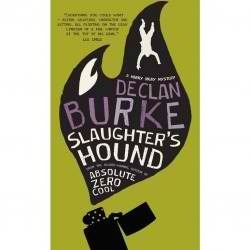Review of Declan Burke's SLAUGHTER'S HOUND

In the Irish crime fiction writer Declan Burke's latest novel, Slaughter's Hound, we renew acquaintance with Harry Rigby, the hero of Burke's 2003 noir debut, Eightball Boogie.
The ending of the previous novel is mentioned often in Slaughter's Hound, so I don't think I'll be plot spoiling by saying that Harry killed his crazy brother Gonzo, in self-defense, at the end of Eightball Boogie. Since then, Harry has paid for his crime over a number of years in different prison and mental institutions in Ireland. The path traveled by Harry in Slaughter's Hound is shaped by the events of Eightball Boogie.
But Harry is a different man to the one we met in Eightball Boogie. He has lost his happy-go-lucky attitude to life. No more the opportunistic chancer who lives by his wits, now he is pushed to his wit's end, lured by the fates into situations where every person he comes across tries to exploit his basically honest nature, where he is driven to the limits of insanity, to the point of indulging in crazy acts of violence and torture that only a man who knows he has lost everything will even contemplate. The first violent act in the novel is the suicide of a friend he had met while they were both being held under lock and key. At that moment begins a plot based on smoke and mirrors, intended to deceive Harry in ways that will benefit nearly everybody else in the story except himself.
Right from the beginning, the reader wonders why Harry has gone back to Sligo. Why couldn't he just have headed for anonymous pastures new, in Dublin, London or New York, where in time he could have forgotten his Judeo-Christian responsibilities to woman, son and false friends? But, if Burke had allowed Harry Rigby to escape from his conscience, there would have been none of the verbal pyrotechnics he treats us to in this book, none of the one-liners about the former Irish real estate moguls, now transformed into necrophiliacs screwing the zombie that is NAMA, none of the black humor about Bartholomew Ahern and his ilk, none of the page-turning tragedy as Harry Rigby is manoeuvred into self-destruction.
Back in Sligo Harry lives a hand-to-mouth existence and poisons himself with questions of conscience. In the effort to make a nearly-honest living, he drives a taxi for an ex-INLA man who needs the taxi company as a front for drug-dealing. How far should Harry get into the drug dealing himself? Should he or should he not form a new relationship with the woman he thought had borne him a son, Ben, but who in fact had brought into the world his brother's son and betrayed him in other ways? (Why does Harry never use the word "nephew" in relation to Ben?) Should Harry continue to maintain the fiction of being the boy's biological father? While refusing to see the boy, he tries to assuage his guilt towards him by paying monthly maintenance payments to Ben's mother, who is in less need of the money than he is himself.
This novel is a tragedy, which takes place in a town called Sligo, a location could be Thebes or any other place in the world where the frailties of good men and women are exploited by the eternal cynics and they become the playthings of the Gods, where a man can sleep with his mother without knowing she is his mother or kill his father without knowing whom he is killing, and be punished as if he had knowingly committed the two heinous crimes. As he twists and turns in the nets that have been set for him, the hero's every good intention or action goes wrong, and Harry Rigby reminds you at times of Job and at other times of Oedipus. His every decent human trait, such as loyalty or friendship, is exploited by the people around him and each betrayal plunges him a little further into the circles of hell. It is at the point where Harry, basically a man who wishes to be good, finally accepts that he should renew his relationship with his ex-partner and her son that the Gods really decide to prove that no good thought or deed from him will go unpunished: they conspire to kill the most precious thing in his life. Of course, Harry again gets the blame, but at that point there is no torture left that can be worse than the one he wishes to inflict on himself.
Highly recommended.







Published on November 28, 2012 11:37
No comments have been added yet.



